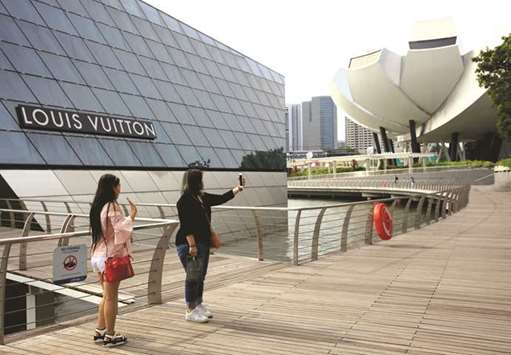Singapore’s economy beat expectations to grow at its fastest pace in nearly four years during the third quarter, data showed yesterday, boosted by a surge in global demand that has buoyed Asia in the face of brewing protectionist fears.
The forecast-beating performance for the island-state follows similarly strong readings from the Philippines, Malaysia, Thailand, South Korea and Taiwan, all of which have benefited from a pick-up in world trade.
The trade ministry said the economy expanded 5.2% on-year in July-September, accelerating from 2.9% in the previous three months and the fastest rate since the fourth quarter of 2013.
It also beat the 5.0 predicted in a Bloomberg News survey.
The improvement came as the key manufacturing sector, a key pillar of the trade-dependent economy, expanded 18.4%, from 8.4% growth in the preceding quarter.
The government raised its full-year growth forecast for this year to 3%-3.5% from the previous projection of 2%-3%.
“In line with stronger demand conditions, the Singapore economy performed better in the third quarter,” the ministry said in a statement.
It said growth outlook for major export markets such as the United States, eurozone, China and Southeast Asia had improved along with a stronger recovery in global electronics demand.
The latest data “adds Singapore to the list of Asian countries that have recently reported better economic growth numbers”, United Overseas Bank (UOB) said in a commentary.
“And the reason (is) very much similar: that the ‘bounceup’ in global trade since the second half of 2016 had spilled over positively, and particularly, to export-oriented Asian economies,” UOB said.
“The best performing sector remains the manufacturing sector, and within it, semiconductor production – a sight that is not unfamiliar when comparing with other semiconductor-producing economies such as South Korea, Japan, Taiwan, and even Malaysia.” Song Seng Wun, a regional economist with CIMB Private Banking said demand is coming from within Asia and outside the region including from the United States and Europe.
He told AFP protectionist rhetoric, led by US President Donald Trump, has not affected trade with Asia so far.
“President Trump may be talking about that but so far that fear hasn’t really materialised,” Song said. “The fear is still there but countries have taken a more pragmatic approach towards trade.”
Earlier this month 11 countries led by Japan pressed ahead with a trans-pacific free-trade agreement without the United States after Trump – touting an America-first policy – pulled his country out of the deal. “Although there are significant concerns among Asian exporters about rising protectionist sentiment in some Western countries...
Asian exports to the US are also showing improving momentum as US consumer demand remains robust,” said Rajiv Biswas, Asia Pacific chief economist at IHS Markit.

Shoppers take selfies in front of a Louis Vuitton shop in Singapore. The trade ministry said the Singapore economy expanded 5.2% on-year in July-September, accelerating from 2.9% in the previous three months and the fastest rate since the fourth quarter of 2013.
